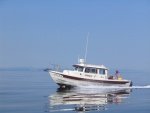I like Yamaha outboards, and would buy a 200 If repowering my 25... But the 70 1 liter is basically the 50 tuned up--as noted by several, the power will be at the high end, not the low end where you want to be to get on a plane. You could decrease the prop pitch, and run the motor at high RPM...Interesting where Yamaha talks about their "Powerful" 17 amp alternator (Same as OP's Honda, and Evinrude brags about their 133 amp magneto--with 50 amps for battery charging--and 83 amps to run the engine..Yet the Fuse is only 10 amps...I haven't figured that one out yet!
I have talked to several who have owned 22's with a 50 hp--they can get on a plane at 12 to 15 MPH. Almost all who have bought a 22, with a 50, used, have repowered.
A lighter boat will plane at a lower speed. Trim tabs and foils (which I believe all C Dorys should have, certainly help get on a plane at lower speeds.) But my 22's were closer to 10 to 12 knots to get on a plane.. (I run a heavy boat--often with cruise gear, food, etc for a month.)'
If I were repowering, I would go with a larger engine-- 115 hp.

